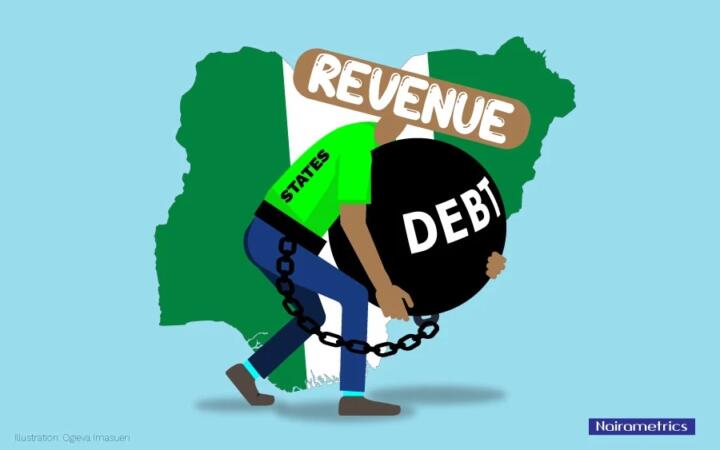In 2022, the Nigerian Federal Government grappled with a significant fiscal crisis, concluding the year with a staggering fiscal deficit of N7.5 trillion, which amounted to 129% of the actual revenue collected.
Initially, the government had set a revenue target of N9 trillion, with a projected deficit of N5.2 trillion. This fiscal conundrum comes to light through data extracted from the 2022 budget implementation report released by the Budget Office.
The surging fiscal deficit underlines the country’s ongoing fiscal challenge as it strives to balance its budget effectively.

Analyzing the Data
As per the budget office’s data, the federal government’s revenue declined to N5.8 trillion, down from N6.7 trillion collected in the same period in 2021. In a bid to manage its expenses, the government allocated N5 trillion for recurrent non-debt expenditures. Personal costs accounted for a significant portion, totaling N3.49 trillion.
However, debt service costs took a massive toll on the government’s finances, amounting to N5.65 trillion during the year, representing a staggering 97.4% of the budgeted revenue. This is a stark contrast to the N4.2 trillion incurred in 2021, constituting 62.8% of budgeted revenue. This debt service encompassed N1.8 trillion in ways and means, with an additional N2.5 trillion and N1.1 trillion spent on domestic and foreign debt service, respectively.
Regarding capital expenditure, the federal government was only able to allocate N1.89 trillion, falling short of the N1.9 trillion spent in 2021 and substantially below its N3.6 trillion target.
The budget office also confirmed that the overall deficit of N7,523.71 billion recorded in 2022 represented a budget-deficit-to-GDP ratio of 3.77%, surpassing the target rate of 3.0% stipulated in the Fiscal Responsibility Act of 2007. The deficit was financed partially through ₦510.21 billion in foreign borrowing and ₦3,654.12 billion in domestic borrowing.
Implications of the Fiscal Crisis
The findings in the report underscore a serious fiscal crisis for the Nigerian federal government, highlighting several critical aspects:
- Larger-Than-Expected Deficit: The fiscal deficit of N7.5 trillion exceeds the government’s budgeted deficit of N5.2 trillion by a substantial margin, constituting 129% of the actual revenue collected. This situation raises concerns about the government’s spending outpacing its revenue, potentially jeopardizing economic stability and growth.
- Decreased Revenue: Actual government revenue in 2022 stood at N5.8 trillion, falling short of the budgeted N9 trillion and even below the N6.7 trillion collected in 2021. This declining revenue stream compounds fiscal challenges, making it increasingly difficult to meet financial obligations. The report emphasized the government’s need to accelerate economic growth and revenue generation to implement annual budgets effectively.
- High Expenditure on Recurrent Costs and Debt Service: The government allocated N5 trillion for recurrent non-debt expenditures, with personal costs accounting for N3.49 trillion. Meanwhile, debt servicing consumed a significant share at N5.65 trillion, representing a daunting 97.4% of the budgeted revenue. This leaves little fiscal room for other essential services and development projects. Efforts to restrain the growth in recurrent expenditure, especially personnel expenditure, are crucial.
- Inadequate Capital Expenditure: Despite significant recurrent expenses and debt servicing, the federal government’s capital expenditure remained low at N1.89 trillion, which is 50% less than the targeted N3.6 trillion. The insufficient capital expenditure hampers infrastructure development and long-term economic growth.
- Budget-Deficit-to-GDP Ratio: The budget-deficit-to-GDP ratio of 3.77% surpasses the 3.0% target outlined in the Fiscal Responsibility Act of 2007. This suggests that the country is living beyond its means relative to the size of its economy. Addressing non-essential fiscal deductions is necessary to free up resources for budget implementation across all tiers of government.
- Financing the Deficit: The deficit was financed partly through foreign borrowing, amounting to ₦510.21 billion, and domestic borrowing, totaling ₦3,654.12 billion. While borrowing is a standard practice to cover fiscal deficits, excessive reliance on it could be unsustainable in the long term, increasing future debt service obligations.
Impact on Exchange Rates
Large fiscal deficits can contribute to a currency crisis by expanding the money supply, leading to inflation and devaluing the domestic currency. This can result in higher interest rates as the government borrows more to cover the deficit, eroding investor confidence and causing capital flight. Depletion of foreign reserves, used to stabilize the currency, exacerbates the situation. This cycle can culminate in a balance of payments crisis, making imports more expensive and widening trade deficits, further pressuring the currency.
These factors create a self-perpetuating loop of economic instability, making it challenging to stabilize the currency. As a result, Nigeria has experienced a currency crisis due to the increased money supply injected into the economy by the government, leading to inflation.”
Support InfoStride News' Credible Journalism: Only credible journalism can guarantee a fair, accountable and transparent society, including democracy and government. It involves a lot of efforts and money. We need your support. Click here to Donate
